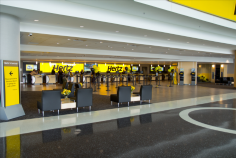For the year, Hertz's revenue was $5.3 billion, with a net loss of $1.7 billion and an adjusted EBITDA loss of $995 million. Liquidity at the end of 2020 was $1.1 billion.
Photo courtesy of Hertz.
On Feb. 26, Hertz Global Holdings reported results for its fourth quarter and full year 2020.
For the fourth quarter, the company's revenue was $1.2 billion, a 48% drop compared to the fourth quarter of 2019. The company posted a net loss of $289 million and an adjusted EBITDA of $140 million for the quarter.
For the year, the company's revenue was $5.3 billion, with a net loss of $1.7 billion and an adjusted EBITDA loss of $995 million. Liquidity at the end of 2020 was $1.1 billion.
The company delivered annualized cost savings of about $3 billion during the year and downsized the fleet so that it would be able to match demand entering 2021. Direct operating and selling, general and administration expenses declined 36% year over year as the company proactively reduced costs in line with demand.
"We are making significant headway on our U.S. Chapter 11 process," said Paul Stone, Hertz Global's president and CEO in a statement. "We are on track to close on the sale of our Donlen vehicle leasing and fleet management business in March 2021 and are making progress on our plan of reorganization with the goal to emerge from Chapter 11 by mid to late summer."
For the fourth quarter, vehicle utilization in the U.S. stood at 74%, compared to 79% in the fourth quarter of 2019. Transaction days in the U.S. were down 46% over the fourth quarter of 2019. However, volume trends continued to improve on a sequential quarterly basis. Off-airport revenues comprised 45% of total revenue for the segment in the fourth quarter 2020 versus 33% in the prior year period.
While total revenue per unit, per month (RPU) dropped to $972 in the fourth quarter compared to $1,059 in 2019, total revenue per day (RPD) fell only 1%, from $43.54 to $43.10.
Average fleet size dropped 46%, from 516,726 to 298,183 comparing the 2020 and 2019 fourth quarters.
Depreciation per unit per month rose 6%, from $283 per unit in the fourth quarter of 2019 to $301 in the fourth quarter of 2020. According to Hertz, depreciation was impacted by “residual values on certain vehicle models” and lower year-over-year retail sales volume during the quarter.
International rental car revenues were down 54% in the fourth quarter on 53% lower volume, narrowing third quarter losses.
Donlen, Hertz’s vehicle leasing and fleet management division, saw revenues decline 21% in the fourth quarter compared to 2019. Adjusted EBITDA fell 27%, while average vehicles fell from 222,400 in the fourth quarter of 2019 to 186,200 in 2020. As announced in November 2020, the company entered into a stock and asset purchase agreement to sell substantially all the assets of Donlen to Athene Holding Ltd. The sale is expected to close in March 2021.
Source: Read Full Article

